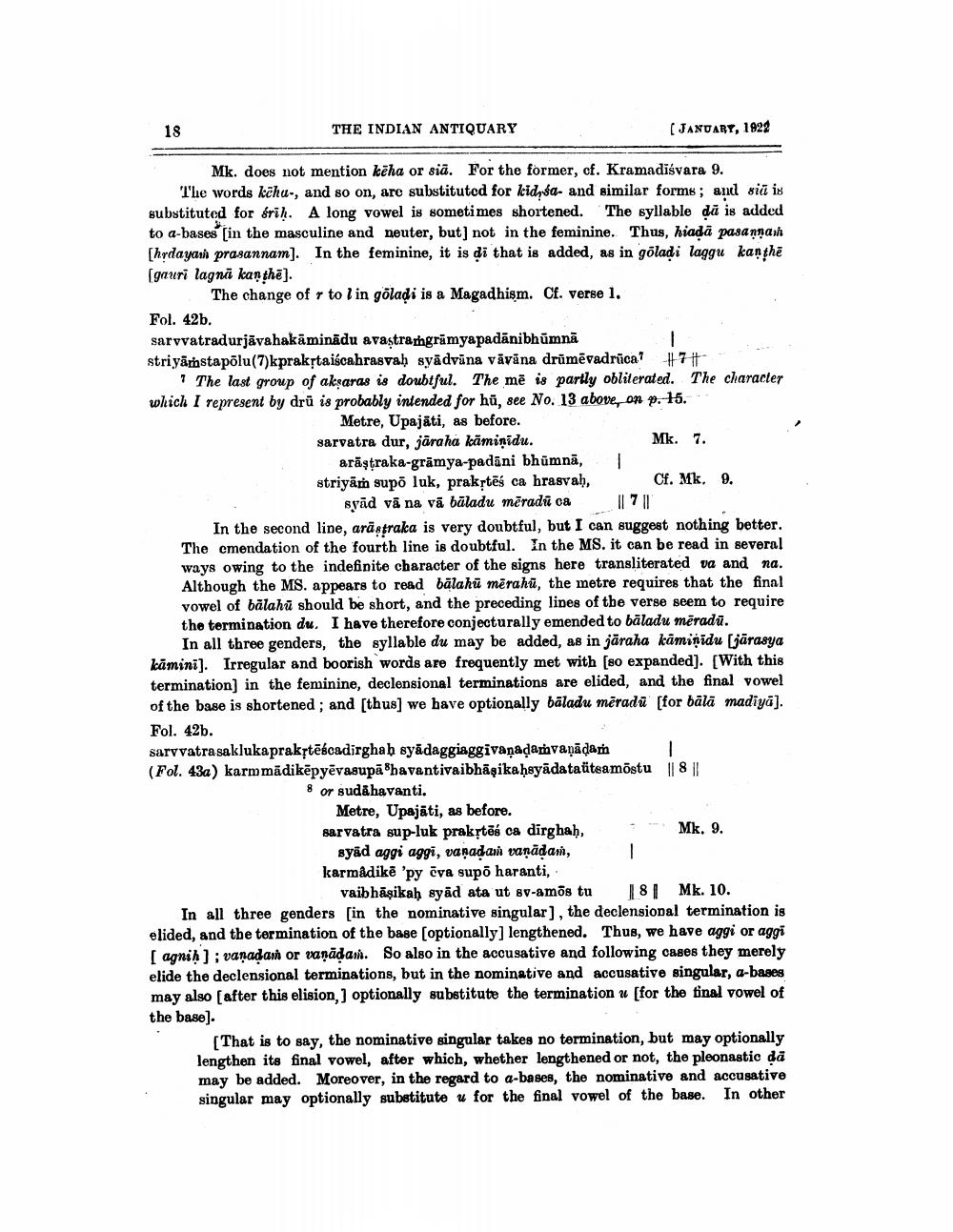________________
THE INDIAN ANTIQUARY
(JANUARY, 1922
Mk. does not mention kēha or siā. For the former, cf. Kramadiśvara 9. The words kēhu-, and so on, are substituted for kid,sa- and similar forms; and siū is substituted for frih. A long vowel is sometimes shortened. The syllable da is added to a bases (in the masculine and neuter, but] not in the feminine. Thus, hiadā pasannah [hrdayanh prasannam). In the feminine, it is di that is added, as in goladi laggu kanthē (gauri lagna kan thē).
The change of r to l in gõladi is a Magadhism. Cf. verse 1. Fol. 42b. sarvvatradurjāvahakāminādu avastrargrāmyapadānibhūmnā striyamstapõlu(7)kprakstaiscahrasvah syadvūna våvåna drūmēvadrüca? #7 |
The last group of aksaras is doubtful. The më is partly obliterated. The character which I represent by drü is probably intended for hū, see No. 13 above, on p. 15.
Metre, Upajāti, as before. sarvatra dur, jāraha kāmiņidu.
Mk. 7. arāştraka-grämya-padāni bhümnă, striyām supo luk, prakrtēs ca hrasvah. Cf. Mk. 9.
syād vä na vā bāladu mēradi oa 11 711 In the second line, arăstraka is very doubtful, but I can suggest nothing better. The cmendation of the fourth line is doubtful. In the MS. it can be read in several ways owing to the indefinite character of the signs here transliterated va and na. Although the MS. appears to read bälahu mērahu, the metre requires that the final vowel of balahū should be short, and the preceding lines of the verse seem to require the termination du. I have therefore conjecturally emended to bāladu mēradū.
In all three genders, the syllable du may be added, as in jāraha kaminidu jārasya kāmini). Irregular and boorish words are frequently met with [s0 expanded). [With this termination in the feminine, declensional terminations are elided, and the final vowel of the base is shortened ; and (thus] we have optionally baladu mēradu (for bālā madiya]. Fol. 42b. sarvvatra saklukaprakstēécadirghab syādaggiaggivaņaďarvaņādam (Fol. 43a) karmmadikēpyēvasupā havantivaibhāşikahsyādataütsamöstu || 8 |
or sudahavanti.
Metre, Upajāti, as before. sarvatra sup-luk prakstēs ca dirghah, - Mk. 9.
syad aggi aggi, vanadan vanādan, karmadikē 'py ēva supo haranti,
vaibhāşikah syād ata ut sv-amos tu 181 Mk. 10. In all three genders in the nominative singular), the declensional termination is elided, and the termination of the base (optionally] lengthened. Thus, we have aggi or aggi ( agnih ] ; vanadan or vanādan. So also in the accusative and following cases they merely elide the declensional terminations, but in the nominative and accusative singular, a-bases may also after this elision) optionally substitute the termination u (for the final vowel of the base).
[That is to say, the nominative singular takes no termination, but may optionally lengthen its final vowel, after which, whether lengthened or not, the pleonastic da may be added. Moreover, in the regard to a-bases, the nominative and accusative singular may optionally substitute u for the final vowel of the base. In other




